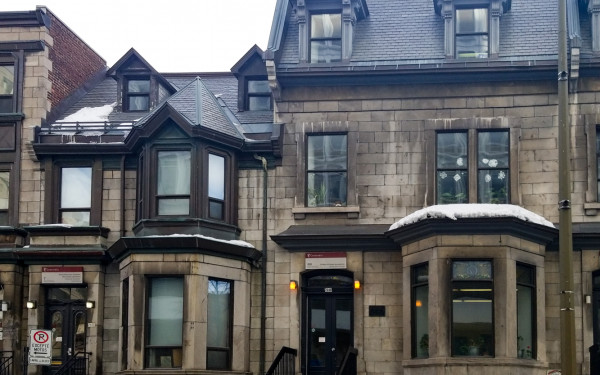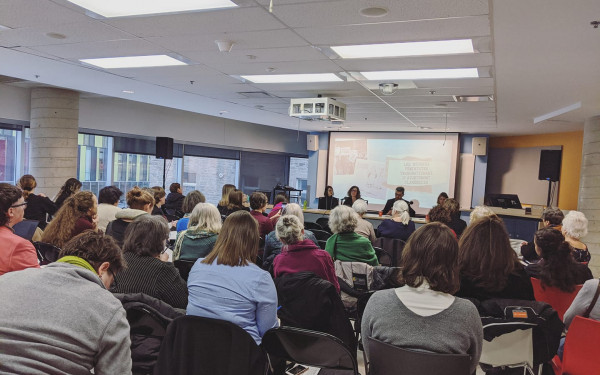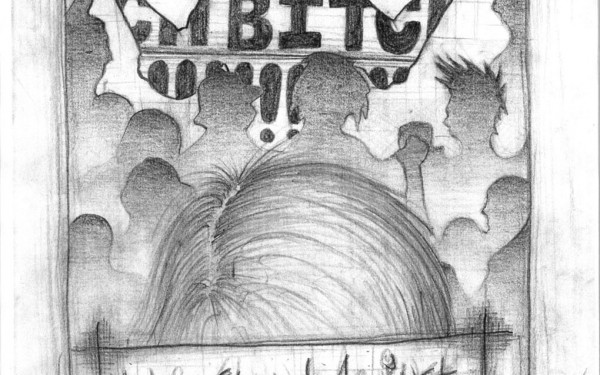Polished Accents and Pulled-back Hair
Concordia Panel Explores Feminism’s Whitewashed History
Ida Ngueng Feze doesn’t identify as a feminist.
As a woman of colour and powerhouse lawyer at McGill’s Department of Human Genetics, Centre of Genomics and Policy, this may come as a shock.
But Ngueng Feze is not the only one. After all, how can one identify as feminist without ignoring the racism in the movement’s history?
How can you root for women’s rights, gender equality and female empowerment and not identify with a movement which advocates for what feminists consider to be a simple and basic element of human morality?
Feminism is often associated with public figures like Amy Schumer and Lena Dunham. These women are criticized for not representing feminism as applicable to all people regardless of race, gender or religion. Their feminism is often called “white.”
The truth is, white feminism goes so much deeper than that, and is much older than it seems. Women of colour have been acknowledging this issue for decades. Research on the subject has been conducted since the end of the 1960s.
“While doing my presentation I was reading a very old paper from Chandra Mohanty and she was basically saying the same thing [that I was saying],” explained Sonia Ben Soltane, a researcher on North African immigration in Quebec. “We are actualizing something very old.”
Concordia University hosted a panel to discuss research compiled from the book Le sujet du féminism, est-il blanc? last Friday. The book is a collection of studies carried out by the six panelists, including Ngeung Feze and Ben Soltane. The research details how feminism continues to exclude women of colour, or relate to their struggles on an international scale.
If the turnout of the conference was any indication of how the subject is gaining traction in the public sphere, there may be room for optimism. Audience members crowded into a conference room in the Henry F. Hall Building on Concordia’s downtown campus, taking up all available space. Some stood in the hallway outside, others sat on the floor. Students from universities across the city attended, some to share their own experiences, others just to listen and learn.
Quebec has quite a complicated history with white feminism.
The right to vote remained the main focus of the feminist movement in Quebec for the first half of the 1900s. Women gained the right to vote at the federal level in 1917, and the rights to vote and run in Quebec provincial elections in 1940. Women of Indigenous descent, however, didn’t receive that right until years later—as late as 1969 in Quebec.
In Quebec today, the provincial government calls for the integration of new immigrants. While it markets this concept as “being knowledgeable about the values of Québec society and conform their behaviour to those norms,” the idea goes much further, explained Naïma Hamrouni, another panelist from Université Laval’s Department of Political Science. It’s an idea that follows women into the political world by dictating how they should look, act and speak in order to thrive professionally. It creates an image that women must strive to attain.
“They have to polish their accents, change their attitudes, and change themselves in order to be accepted in the male, white world of politics. In a way, they have to whitewash themselves.” – Naïma Hamrouni
Hamrouni revealed how the accepted view of integration may be dangerous. By encouraging this idea, many women are forced to modify themselves to appeal to the overwhelmingly white population that makes up the Quebec political sphere. It demands conformity instead of acceptance.
“They have to polish their accents, change their attitudes, and change themselves in order to be accepted in the male, white world of politics,” she explained. “In a way, they have to whitewash themselves.”
Hamrouni argued that a quick look at the makeup of the Quebec National Assembly points to this fact. She explained that women represent barely more than a quarter of its 121 members.
“And guess how many women of colour there are,” she continued. There is just one.
Whitewashing is also manifested through the lack of acceptance for Black women’s natural hair, Ngueng Feze explained. During the conference, she recalled how her own experience inspired her to launch an investigation into how systemic racism forces Black women to modify their natural hair to conform to white beauty standards.
“When I came to Quebec as a first generation immigrant about seven years ago, I had natural hair,” she explained. “I went into the law faculty at the Université de Montreal and a lot of people would come to me and say that I was courageous for having my hair out. I had professors even tell me that it was their first time having a student with natural hair.”
Ngueng Feze continued to explain that amidst the rising discussions of acceptance for Black women’s natural hair, its presence in the media and political sphere is lacking.
“There are cases everywhere of people being fired from their jobs for having natural hair,” she pointed out. “Many Black women fear not being able to get a job, not because of their qualifications, but because of their appearance and particularity of their hair.”
Despite what they describe as white feminism’s ugly history, the panel itself may be an indication of how these subjects are gaining traction in feminist conversation.
“I think there has been a big change,” said Leïla Benhadjoudja, another panelist and a University of Ottawa professor. “If this same panel was held five years ago, I don’t think the response in the auditorium would be the same.”

web_900_600_90.jpg)





